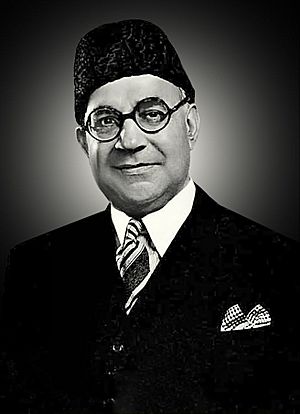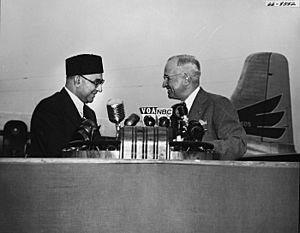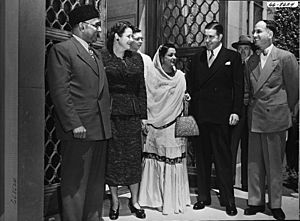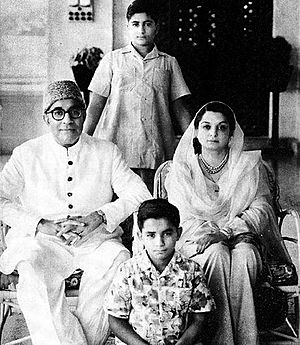Liaquat Ali Khan facts for kids
Quick facts for kids
Nawabzada
Liaquat Ali Khan
|
|
|---|---|
| لِیاقت علی خان | |

Khan in 1945
|
|
| 1st Prime Minister of Pakistan | |
| In office 15 August 1947 – 16 October 1951 |
|
| Monarch | George VI |
| Governor-General | Muhammad Ali Jinnah (1947–1948) Khawaja Nazimuddin (1948–1951) |
| Preceded by | Position established |
| Succeeded by | Khawaja Nazimuddin |
| 1st Minister of Defence | |
| In office 15 August 1947 – 16 October 1951 |
|
| Preceded by | Office established |
| Succeeded by | Khawaja Nazimuddin |
| 1st Minister of Foreign Affairs | |
| In office 15 August 1947 – 27 December 1949 |
|
| Deputy | M. Ikramullah (Foreign Secretary) |
| Preceded by | Office established |
| Succeeded by | Zafarullah Khan |
| Minister for Kashmir and Frontier Affairs | |
| In office 15 August 1947 – 16 October 1951 |
|
| Preceded by | Office established |
| Succeeded by | Mahmud Hussain |
| Minister of Finance of British India | |
| In office 29 October 1946 – 14 August 1947 |
|
| Monarch | George VI |
| Governor General | Archibald Wavell (1943–1947) Lord Mountbatten (1947) |
| Vice President | Jawaharlal Nehru |
| Preceded by | Office established |
| Succeeded by | Office abolished |
| President of the Pakistan Muslim League | |
| In office 11 September 1948 – 17 October 1951 |
|
| Preceded by | Muhammad Ali Jinnah |
| Succeeded by | Khawaja Nazimuddin |
| Personal details | |
| Born | 1 October 1895 North-Western Provinces, British India (now Uttar Pradesh, India) |
| Died | 16 October 1951 (aged 56) Rawalpindi, West Punjab, Pakistan (present-day Punjab, Pakistan) |
| Cause of death | Assassination |
| Resting place | Mazar-e-Quaid |
| Nationality | Indian (1895–1947) Pakistani (1947–1951) |
| Political party | |
| Spouse |
Ra'ana Liaquat Ali Khan
(m. 1932–1951) |
| Alma mater | Aligarh Muslim University (BSc in Polysci) Oxford University (LL.B. in Jurisprudence) |
Liaquat Ali Khan (born October 1, 1895 – died October 16, 1951) was a very important leader in the creation of Pakistan. People in Pakistan often call him Quaid-e-Millat, which means "Leader of the Nation," or Shaheed-e-Millat, meaning "Martyr of the Nation." He was a lawyer and a political thinker.
After Pakistan became independent on August 14, 1947, Liaquat Ali Khan became its first Prime Minister. He also served as the first foreign minister, defense minister, and minister for frontier regions until he was assassinated in 1951. Before Pakistan's independence, he was the Finance Minister of British India.
He believed in a democratic government and helped Muhammad Ali Jinnah campaign for a separate Muslim nation. This movement became known as the Pakistan Movement. As Prime Minister, he guided Pakistan during its early years. He also introduced the Objectives Resolution, which said that Pakistan's constitution would be based on Islamic ideas.
Contents
Early Life and Education
Liaquat Ali Khan was born in Uttar Pradesh, which was part of British India. His family was well-known and respected. They wanted him to get a good education in the British system.
He went to Aligarh Muslim University (AMU) and studied law and political science. He earned his degrees in 1918. In 1919, after his father passed away, he went to University of Oxford in England. There, he earned a Master of Law degree in 1921. While at Oxford, he was active in student groups. He was even elected treasurer of the Majlis Society, which worked for Indian students' rights.
Becoming a Political Leader
In 1923, Liaquat Ali Khan returned to India. He wanted to help Indian Muslims who he felt were treated unfairly by the British government. He first thought about joining the Indian National Congress. However, after meeting with Jawaharlal Nehru, his ideas changed.
He decided to join the All-India Muslim League in 1923. This party was led by another lawyer, Muhammad Ali Jinnah. In 1924, Khan attended a meeting in Lahore where the Muslim League discussed its goals. He helped suggest new aims for the party.
Serving in the United Provinces
In 1926, Ali Khan was elected to the legislative council for the United Provinces. He worked hard to represent the Muslim communities there. He often spoke about the problems they faced.
He also worked with Ziauddin Ahmed to organize Muslim student groups. His strong support for Muslim rights made him well-known. He earned respect from both Muslim and Hindu communities. He stayed an elected member until 1940.
Working with the Muslim League
Liaquat Ali Khan became a very important member of the Muslim League. He was part of the group that attended the National Convention in Calcutta. He also met with the Simon Commission, which was set up by the British government.
In 1932, he married Ra'ana Liaquat Ali Khan, who was an economist. She became a key figure in the Pakistan movement too. Khan strongly believed that Muslims had their own unique culture. He felt they had every right to protect it.
Jinnah left India for London in the early 1930s. Liaquat Ali Khan and his wife worked hard to convince Jinnah to return. They wanted him to unite the Muslim League and lead the movement for a separate Muslim nation.
Helping Create Pakistan
When Muhammad Ali Jinnah came back to India, he started to reorganize the All-India Muslim League. In 1936, Jinnah suggested that Khan become the Honorary General Secretary of the League. Everyone agreed, and Khan held this position until Pakistan was created in 1947.
In 1940, Khan became the deputy leader of the Muslim League's parliamentary group. Jinnah was very busy with political work, so Khan often spoke for the party in the assembly. He was also in charge of the newspaper Dawn.
The idea of Pakistan was formally adopted in 1940 at a meeting in Lahore. This was called the Pakistan Resolution. Khan was elected to the central legislative assembly without a contest. In 1941, he helped pass a resolution that made the goals of the Pakistan Resolution part of the Muslim League's main aims.
Leading the Interim Government
In 1945–46, elections were held across India. Khan won his election easily. He also became Chairman of the Muslim League's Central Parliamentary Board. The Muslim League won most of the seats reserved for Muslims.
Khan helped Jinnah in talks with the British and the Congress Party. It was decided that an interim government would be formed. This government would include members from the Congress, the Muslim League, and minority leaders. Khan was chosen to lead the Muslim League group in this cabinet. He was given the important job of Finance Minister. Finally, on August 14, 1947, Pakistan became an independent country.
Pakistan's First Prime Minister

After Pakistan gained independence, Liaquat Ali Khan was appointed as its first Prime Minister. Muhammad Ali Jinnah officially swore him into office. Pakistan was a new country, and it faced many challenges. The world was also entering the Cold War, with the United States and the Soviet Union as major powers.
Khan's government faced problems with different political groups inside Pakistan. He also had to deal with the dispute over Kashmir with India. He tried to find a peaceful solution with India's Prime Minister, Jawaharlal Nehru. They reached an agreement to stop the fighting, and Nehru took the issue to the United Nations.
Khan also suggested that Abdul Rashid become Pakistan's first Chief Justice. He also recommended Abdur Rahim as President of the Constitutional Assembly. Khan worked to make the Muslim League the main political party in Pakistan.
Some people criticized Khan for mixing religion and politics. They felt that he gave too much power to religious political groups. They also believed he delayed writing the constitution to keep power away from the Bengali majority.
Building the New Nation

As Prime Minister, Ali Khan worked to build up education and science in Pakistan. He invited important scientists like Salimuzzaman Siddiqui to help the country. He also asked Raziuddin Siddiqui to plan new research institutes.
Khan's government also approved the creation of the University of Sindh. He believed that bringing Muslim scientists and engineers from India to Pakistan was vital for the country's future.
In terms of the economy, Khan and his Finance Minister, Malick Ghulam, planned to develop the country using investment and capitalism. They focused on a planned economic system. However, Pakistan's economy soon relied heavily on aid from the United States. In November 1949, a National Bank was set up, and a paper currency mill was installed in Karachi.
Foreign Policy Choices
In 1949, both the Soviet Union and the United States invited Ali Khan to visit. In May 1950, Khan visited the United States. This visit helped strengthen ties between Pakistan and the Western countries. Khan wanted Pakistan to be neutral in the Cold War. He asked the U.S. for economic support to help Pakistan become strong.
However, relations became difficult when the U.S. asked Pakistan to send troops to the Korean War. Khan wanted to send troops but asked for assurances on the Kashmir issue. The U.S. refused, so Khan decided not to send the troops. This showed Pakistan's desire to remain neutral.
Khan also started to build closer relations with the Soviet Union, China, and Iran. He sent ambassadors to these countries. Pakistan was the first Muslim country to establish relations with China.
Challenges and Changes
Ali Khan's leadership faced challenges from different groups, including communists and socialists. There were also disagreements within the Pakistan Armed Forces. Some military leaders were unhappy with Khan's diplomatic approach to India.
After Jinnah's death in 1948, Khan did not become Governor-General. Instead, he appointed Khawaja Nazimuddin. Khan worked to make Pakistan a parliamentary democracy. In 1949, he oversaw the creation of the October Objectives. This document aimed to create an Islamic, democratic, and federal constitution for Pakistan.
The Muslim League party itself had problems. It was not very strong and faced issues like corruption. In East Pakistan, people felt that Ali Khan did not pay enough attention to their development. This weakened the party's support there.
His Tragic Death
On October 16, 1951, Liaquat Ali Khan was giving a speech to a large crowd in Rawalpindi. He was shot by an assassin named Said Akbar. The police immediately shot the attacker. Khan was rushed to the hospital but died from his injuries.
Said Akbar was from Afghanistan. The exact reason for the assassination has never been fully known, and there is much speculation about it.
After his death, Khan was given the title "Shaheed-e-Millat" (Martyr of the Nation). He is buried at Mazar-e-Quaid, the mausoleum for Jinnah in Karachi. The park where he was assassinated was renamed Liaquat Bagh in his honor. This is the same place where former Prime Minister Benazir Bhutto was assassinated in 2007.
His Lasting Impact
Liaquat Ali Khan was Pakistan's longest-serving Prime Minister. He led the country for 1,524 days. Many people in Pakistan remember him as a "martyr for democracy." They believe he gave his life to protect Pakistan's parliamentary system.
After his death, his wife, Ra'ana Liaquat Ali Khan, remained an important figure. She even became the Governor of Sindh Province in the 1970s. Liaquat Ali Khan's assassination is still a mystery.
He is widely known as Quaid-i-Millat (Leader of the Nation) and Shaheed-i-Millat (Martyr of Nation). Most Pakistanis remember him fondly. A newspaper called Daily Jang wrote that "his name will remain shining forever on the horizon of Pakistan."
He is seen as Jinnah's "right hand man" and his chosen successor. His leadership after Jinnah's death was crucial. He helped Pakistan deal with major problems in its early years. The government of Pakistan has released stamps with his face on them to honor him.
Places Named After Him
- Liaquat National Library: Pakistan's largest library.
- Liaquat University of Medical and Health Sciences: A medical university.
- Liaquat National Hospital: A government hospital.
- Liaquat National Garden: The garden where he was assassinated.
- Liaquat Pur: A town named after him.
- Liaquat Pur Railway Station: A railway station in Liaquatpur.
- Liaquatabad Town: A populated town in Karachi.
Images for kids
-
Prime Minister Ali Khan addressing the American public at a local ceremony in New Orleans, 1950.
See also
 In Spanish: Liaquat Ali Kan para niños
In Spanish: Liaquat Ali Kan para niños
 | Jackie Robinson |
 | Jack Johnson |
 | Althea Gibson |
 | Arthur Ashe |
 | Muhammad Ali |




